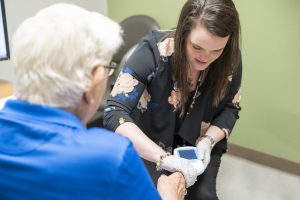
Pharmacists’ anticoagulation clinics provide thorough patient care
As an inpatient clinical pharmacist, Kate Haivala, Pharm.D., doesn’t usually get to spend a lot of time with patients. She spends most of her day verifying and dispensing orders for hospital patients, monitoring their medication dosing and consulting with providers and fellow caregivers. But over the past few years Dr. Haivala has helped develop a program that provides more thorough care for patients, and it allows inpatient pharmacists to meet directly with patients.
She was encouraged by Spearfish Hospital Pharmacy Manager Tiffany Clendenen, Pharm.D., to develop an “anticoagulation clinic,” a process in which pharmacists follow up with patients who were prescribed blood-thinning drugs to ensure the medicine is working properly and not causing harmful side effects. Warfarin, a mainstream blood-thinning medication, can prevent blood clots, but can also potentially cause life-threatening side effects such as excessive bleeding. Therefore, it’s very important to follow up with patients after they leave the hospital or clinic to ensure the medication is working appropriately.
“If this medication doesn’t work correctly, it could really affect a patient’s life. These clinics allow us to be proactive in identifying any signs that something might be wrong, which really benefits both patients and providers,” Dr. Haivala said.
Providers refer patients to the program, and if they agree, they’ll receive a call from a pharmacist that day. Patients then meet with a pharmacist monthly to review any changes in diet, exercise or medication, be proactive regarding any upcoming procedures that could have an effect and make sure they are not experiencing negative side effects.
“As inpatient pharmacists we’ve gone from working within the confines of one room to hearing what patients had for breakfast that morning and what their plans are for the day. We really develop a relationship with them. We typically don’t get to do much of that, but here we’re privileged.”
The first clinics started at the 10th Street medical clinic in Spearfish two years ago. Since then, clinics have opened in Rapid City and Lead-Deadwood, and pharmacists in Hot Springs (through Fall River Health Services) have been trained to provide clinics there as well. Sturgis is next on the list. Dr. Clendenen said the pharmacy team in Spearfish was ecstatic about leading this initiative. “I am so proud of them for getting this started and spreading it throughout the system. It’s about doing the right thing for patients,” she said.
Dr. Haivala said the program’s success has had a lot to do with teamwork between pharmacists in all markets. Justin Muth, Pharm.D. (Spearfish), Tony Ratzsch, Pharm.D. (Lead-Deadwood) and Claire Colgan, Pharm.D. (Rapid City) have all managed clinics of their own. But the project has also relied on physicians in each market who have championed the effort, as well as Epic experts who have helped streamline the process from a medical records standpoint.
At the end of the day, Dr. Haivala said she hopes this shows patients how much we really care about them and their safety. “I always look forward to seeing them again to see how they’re doing. When I meet them in the waiting room and they are happy to see me, it gives me a sense that they are satisfied with their service.”
Thank you to pharmacists across our system for helping provide comprehensive care for our patients.
